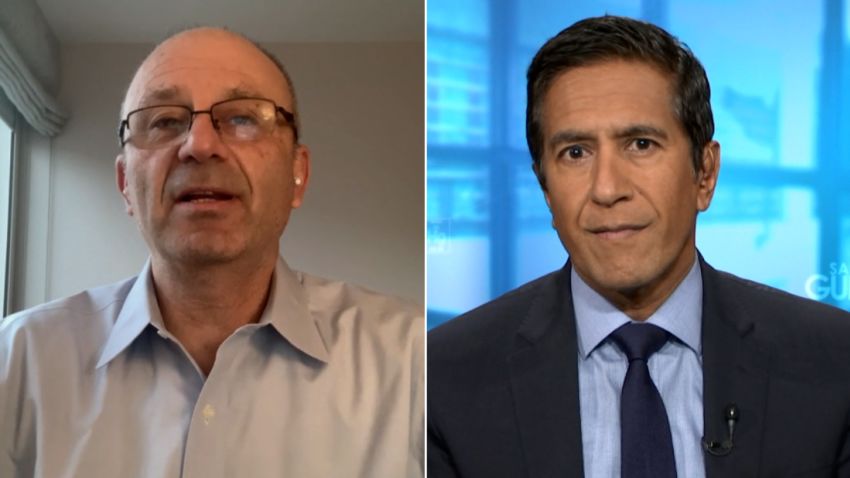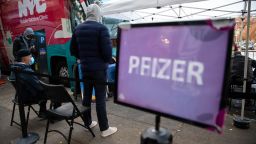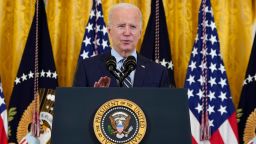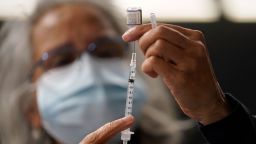The message from Capitol Hill on Wednesday night was clear. Nearly two years after the pandemic began, with a new coronavirus variant sweeping the US, the search for bipartisan political consensus on the way forward continues, with no end in sight.
In a rebuke of one of President Joe Biden’s central efforts to combat Covid-19, a slim Senate majority voted to overturn his vaccine mandate for businesses. Two Democrats from conservative states, Joe Manchin of West Virginia and Jon Tester of Montana, joined Republicans, led by Indiana Sen. Mike Braun, in seeking to reverse the requirement. The change will not become law, given its uncertain status in the House and the promise of a veto from the White House. But the bipartisan vote, albeit narrow, reflects a nation still at odds about how to finally escape the pandemic, despite clear public health guidance that more widespread vaccine uptake is key.
Biden entered office with a clear promise about the pandemic: to deliver a coherent strategy for beating it back and, as he often said on the 2020 campaign trail, to always “follow the science” in that pursuit.
The reality has been more complicated.
And for a country devastated on so many fronts by the pandemic, the administration’s shifting messages – sometimes necessary; occasionally delayed or in error – have been all the more vexing. The challenge has been made vastly more complicated by Republican Party leaders, especially in the states, working overtime to turn measures intended to combat the virus into political wedge issues and discourage simple and effective mitigation efforts, from masks to vaccine requirements.
“I’ve seen more of Dr. (Anthony) Fauci than my wife,” Biden joked last week, referring to his chief medical adviser during a speech about his plan for the coming months. As he spelled out a series of initiatives, the President acknowledged the man-made obstacles in his path. “Covid-19 has been very divisive in this country. It’s become a political issue, which is a sad, sad commentary,” he added. “It shouldn’t be, but it has been.”
Biden asked Americans to put that “divisiveness” behind them, but just as with conquering the virus, there is little to suggest his wish will be realized. On Tuesday night, those divisions were in stark display in the Senate.
A day before the vote on Biden’s vaccine requirements, Majority Leader Chuck Schumer, a New York Democrat, slammed Republicans over their work to undermine the Biden directive, unveiled in September, that called on the Labor Department to require businesses with 100 or more employees to mandate their workers either be vaccinated or undergo weekly testing for Covid-19. The emergency rule was issued last month, setting off a torrent of lawsuits from Republican-led states, private employers and even some liberal-leaning unions before it was supposed to take effect in January. After a federal appeals court temporarily blocked the vaccine rules, multiple lawsuits were consolidated and reassigned to a conservative-leaning federal appeals court in Ohio, with many expecting the case to end up before the US Supreme Court.
“If their plans go into effect, Covid will linger longer and the chance of new variants and new more dangerous variants occurring increases,” Schumer said of Republicans. “It is anti-science, anti-common sense. It makes no sense.”
Some GOP senators insisted their resistance to Biden’s mandate was rooted in their opposition to compelling private citizens to get the shots.
“This is not about being anti-vaccine,” said Sen. Steve Daines of Montana. “I was part of the Pfizer trial. I am pro-science, pro-vaccine, but I’m anti-mandate.”
New variants shift the goalposts
Now, as cases of the omicron variant spread across the US, the country is increasingly also contending with a dangerous and distressing strain of uncertainty. Its tentacles touch almost every part of American life, from gas prices and supply chain issues to difficult questions over what level of vaccination – for those who’ve already sought and received two shots – is sufficient to protect them from a virus that has now killed nearly 800,000 Americans and more than 5 million people worldwide.
Fauci, the director of the National Institute of Allergy and Infectious Diseases, said on CNN Wednesday that his opinion is it’s a matter of when, not if, the definition of fully vaccinated will change to include three doses of Covid-19 vaccine – but that he wants everyone to get a third shot regardless.
“I don’t think anybody would argue that optimal protection is going to be with a third shot,” Fauci said. “It’s a technical, almost semantic definition, and it is the definition for requirements.”
As a matter of both policy and personal understanding, the prospect of new guidance is – recent history strongly suggests – going to fuel existing frustration and resentment, especially among GOP partisans.
A recent analysis by the nonprofit Kaiser Family Foundation underscored the depths of the rift between Democrats and Republicans on vaccines – though, perhaps more than any other, the issue offers a broader representation of the messy landscape.
The foundation reported last month that “partisanship is now the strongest self-identifying predictor of being unvaccinated.” And in an analysis it published at the beginning of December, the authors said, “Four in ten Republicans remain unvaccinated and smaller shares of vaccinated Republicans – especially older Republicans – report receiving a booster dose.”
Overall, the number of fully vaccinated Americans to receive a booster, or additional dose, currently stands at about 49 million, according to US Centers for Disease Control and Prevention data. That amounts to a little more than a quarter of fully vaccinated adults overall and less than 50% of fully vaccinated seniors.
The pace of vaccinations does appear to be speeding up over the past month, with a seven-day average of nearly 500,000 Americans initiating vaccinations and an average of about 1.9 million shots being administered each day. Nearly a million of those are boosters.
But with nearly a quarter of the eligible population still unvaccinated, the pandemic is again throwing the political world for a loop – adding another unwelcome dose of debate and ambiguity to the social terminology around vaccination.
When it became clear earlier in the day on Wednesday that Biden’s vaccine requirement for businesses would face a rebuke in the Senate, the Republican super PAC America Rising pounced, releasing a batch of recent comments from a pair of Democratic governors, Gretchen Whitmer of Michigan and Laura Kelly of Kansas, along with Manchin and Tester, expressing either trepidation or opposition about certain vaccine mandates.
“Joe Biden’s failed agenda created the economic hardship Americans are facing right now, and a vaccine mandate would only further exacerbate the problem,” America Rising PAC press secretary Whitney Robertson said in a statement. “Even notable members of his own party are refusing to sign their names to such a terrible idea.”
Meanwhile, during a week when Congress zigged, New York City Mayor Bill de Blasio zagged, surprising the public with an announcement that the city would – over the Democrat’s final month in office – adopt a “first-in-the-nation vaccine mandate for private-sector workers.” The rule takes effect on December 27 and will “apply to roughly 184,000 businesses,” his office said.
The new regulation is likely destined for a courtroom. It has set off a mixture of outright opposition and anger over what many perceive as yet another life-altering decision taken without much public debate. Already, a preexisting requirement for municipal workers is headed back to court next week after a judge on Tuesday set a date for new arguments over a New York City Police Department detective’s request to halt a municipal mandate. The political and legal battles ahead come as case numbers in the city and state are on the rise and just before the peak of the holiday travel season.
A green shoot of hope as winter bears down
This week has, so far, brought a welcome bit of mostly good news for Biden on a few fronts, including with gas prices trending down, supply chain snags decreasing and early data from Pfizer and BioNTech that a third dose of the vaccine can improve protection against the Omicron variant.
But relief does not necessarily translate to confidence, a political conundrum for the Biden White House as it seeks to navigate its first Covid-era winter.
A new poll from Monmouth University on Wednesday underscored the topsy-turvy political environment. Two-thirds of respondents said the country was on the wrong track, about the same as the last two months, but up from 50% in April. Covid-19 ranked as the top worry among respondents, at 18%, just ahead of “Everyday bills, groceries, etc.” (15%) and inflation (14%). The latter two issues, as Monmouth University Polling Institute director Patrick Murray pointed out, are intricately connected, adding that “as one would expect, many are placing the blame squarely on Washington.”
The reality is that all three, and a number of concerns further down the line, are deeply intertwined even if Americans and their political leaders perceive them as distinct dangers or frustrations. With the midterm election season on the horizon, the pull of holistic messaging will be even weaker, as both parties seek out winning issues they can narrowcast to the voters who will decide control of Congress, governors’ races and state legislative contests.
There was, however, some bracing news for the administration and many Democrats in the poll, which showed that support for Biden’s Build Back Better legislation, which addresses paid leave, child and elder care, health care, college, climate change and more, remains robust. (This despite its uncertain fate in Congress after passing the House but facing a tough road ahead in the Senate.) The bipartisan infrastructure deal passed by both chambers and signed by Biden is also immensely popular, with 66% of Americans approving of it.
Biden’s chief of staff retweeted a short summary of the Monmouth poll’s approving verdict on the Democratic legislative agenda. And in Missouri, where he spent the day selling the bipartisan package, Biden took a little jab at his predecessor amid a rare victory lap.
“I don’t think I could take one more phrase that it’s going to be ‘infrastructure week,’” Biden said to applause at the Kansas City Area Transportation Authority. “Guess what? It’s going to be infrastructure decade now, man.”
Whether or not the law he was celebrating remains popular and succeeds in its ambitions, it seems unlikely that this young, deeply troubled decade will be so easily labeled.






